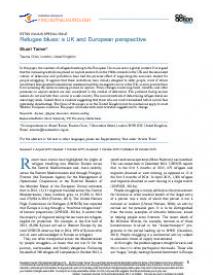Refugee blues: a UK and European perspective
In this paper, the numbers of refugees travelling to the European Union are set in a global context. It is argued that the increasing restrictions placed on asylum seekers from the 1980s onwards in the UK and the associated culture of deterrence and prohibition have had the perverse effect of supporting the economic market for people smuggling. It appears that these restrictions were initially designed to deter people, most of whom would have been granted humanitarian assistance had they managed to arrive in the UK, so as to prevent them from accessing the decision-making process on asylum. Policy changes concerning travel, benefits, and other pressures on asylum seekers are also considered in the context of deterrence. The problems facing asylum seekers do not end with their arrival in a safe country. The current methods of determining refugee status are alarmingly weak. Indeed there is evidence suggesting that those who are most traumatised before arrival face systematic disadvantage. The focus of this paper is on the United Kingdom but its conclusions apply to most Western European countries. The paper concludes with some tentative suggestions for change.
Geachte bezoeker,
De informatie die u nu opvraagt, kan door psychotraumanet niet aan u worden getoond. Dit kan verschillende redenen hebben,
waarvan (bescherming van het) auteursrecht de meeste voorkomende is. Wanneer het mogelijk is om u door te verwijzen naar de bron
van deze informatie, dan ziet u hier onder een link naar die plek.
Als er geen link staat, kunt u contact opnemen met de bibliotheek,
die u verder op weg kan helpen.
Met vriendelijke groet,
Het psychotraumanet-team.
Reference:
Stuart Turner | 2015
In: European journal of psychotraumatology, ISSN 2000-8066 | 6 | 29328
http://www.ejpt.net/index.php/ejpt/article/view/29328
In: European journal of psychotraumatology, ISSN 2000-8066 | 6 | 29328
http://www.ejpt.net/index.php/ejpt/article/view/29328


